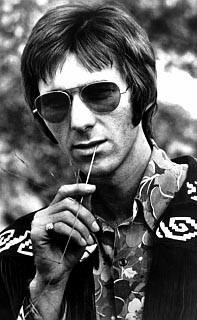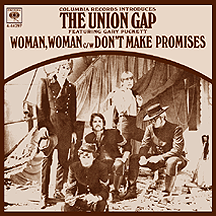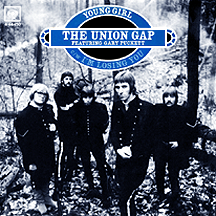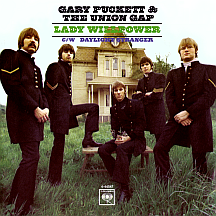GARY PUCKETT AND
THE UNION GAP
The small city of Hibbing, Minnesota has produced more than its share of celebrities. Folk singer-songwriter and inspiration-to-up-and-coming rockers Bob Dylan grew up there. 61-homers-in-one-year major league baseball slugger Roger Maris was born there. It was also the city where promising, bright-future singer Gary Puckett was born, though his image is much more closely associated with Yakima, Washington (his family, headed by a piano-playing mom and sax-blasting dad, moved there when he was a youngster) and the small, adjacent city of Union Gap. He spent most of his childhood and teenage years in Yakima before moving to Twin Falls, Idaho, where in 1960 he graduated from high school, afterwards relocating once again to San Diego, California.
Gary played guitar with a San Diego folk group, The Continentals, and an R&B-influenced band, The Ravens, before taking a different path as a singer with his own three-piece group, first trying out the name Gary and the Remarkables, then settling on The Outcasts, a somewhat unremarkable eponym, as there were several mid-'60s acts also using it, scattered around the U.S. and U.K. and, perhaps, other countries. Gary's Outcasts went through a few lineup changes but worked steady gigs around San Diego including a lengthy stand at a club called the Quad Room; the band's material evolved from a southern soul influence to a harder type of rock in the wake of the mid-decade influx of British bands dominating American airwaves. In 1966 the Outcasts, a quartet by that time with the addition of tenor saxophonist Dwight Bement, cut a single for the independent Karate label, "I Can't Get Through to You," a good pop-rocker more garagelike than anything else Puckett would be known for.
The Outcasts were short-lived due to disagreements over musical direction and Gary's insistence on calling the shots. He and Bement formed a new five-piece band called The Union Gap, after the Yakima-area city, with bassist Kerry Chater (originally from Vancouver, British Columbia), and two others from San Diego: keyboard player Gary Withem, who later adopted the nickname "Mutha," and drummer Paul Wheatbread, who left the band after a promising start, only to return in time for the group's successful run. The unusual name was more than just a whim; Gary conceived it as a logical moniker to go with his new idea, wearing Civil War uniforms representing the Union Army (much as Paul Revere and the Raiders had done with their Revolutionary War attire), figuring this would help them stand out among competing bands. The other four scoffed at the idea, but once implemented, people responded positively...if not fanatically!
An audition package was put together (a demo tape of older Outcasts recordings and photos of the group in their Civil War uniforms) and the guys headed to Los Angeles to take their shot. Rejection came from labels large and small, but a bit of good timing came when Gary stopped by the offices of Columbia Records and made a connection with Jerry Fuller (a singer with a few '59-to-'61 hits and greater success as the composer of some of Ricky Nelson's biggest sellers including the chart-topping "Travelin' Man"). Jerry went to see the group perform at a bowling alley in San Diego and offered them a contract...stipulating, as was all too typical, that he would be calling the shots. Suddenly Gary was a labelmate of hometown folk hero Dylan and hysterical/historical uniform-wearing hitmakers Revere and the Raiders.
Success came immediately with "Woman, Woman," written by Jim Glaser of country group Tompall and the Glaser Brothers and Jimmy Payne, a longtime associate of and part time musician with the Glaser family act. Recorded during the Gap's first sessions in August 1967, it was released soon afterwards as the debut single by The Union Gap featuring Gary Puckett and reached the top ten in December. Columbia played up the Civil War angle, putting out press releases with assigned ranks for each band member: General Puckett, Sergeant Bement, Corporal Chater and Privates Wheatbread and Withem. The concept went to extreme when, at about the time the Union Gap debuted, another Columbia band, The Buckinghams, appeared on record covers wearing Confederate uniforms (despite being from Chicago, hardly a southern city under Jefferson Davis's wartime presidency), creating some confusion as to who had come up with the idea first.
Fuller produced the Union Gap's recordings with arranger Al Capps, positioning them as more of a light "love song" ensemble than Puckett preferred. "Young Girl" came on the heels of the first single, an even bigger hit that made it to number two on Billboard (and number one on Cash Box) in April 1968; it was written by Fuller as was the summertime follow-up, "Lady Willpower," which marked a switch in the label credit to Gary Puckett and the Union Gap and repeated the two-one chart pattern. Fuller's "Over You," a slower-tempoed weeper, made it to the top ten in October. Their hits could be considered a precursor to the "soft rock" movement of the '70s, a musical backslide difficult to predict as early as '68...but it wasn't a concern at the time. Gold records were taking up lots of space on the walls of each group member caught in a whirlwind of recording, touring and depositing six-figure checks.

Four singles, four million sellers. Gary and the Gap capped an explosive '68 with a Grammy nomination in the coveted Best New Artist category (Latino "Light My Fire" hitmaker Jose Feliciano won the award). But by the time the ceremony rolled around in March '69 (it was edited and broadcast on NBC in May), there was division within the ranks (Gary and Dwight had been down this road before). The band members had creative differences with Puckett while he had run-ins with Fuller over the material, a situation not uncommon when music acts go from zero to 60 in a relatively short time. Instead of releasing another Jerry Fuller tune, the next single, "Don't Give In to Him," written by Gary Usher (best known for composing some of The Beach Boys' hits), was a bit more complex (and thus somewhat less commercial) than the previous four; it peaked just short of the top ten in the spring of '69, a hit by normal standards but a disappointment following a quartet of runaway smashes. Fuller took an "I told you so" attitude, deepening the rift. The next 45 was produced by Dick Glasser with arranger Ernie Freeman; "This Girl is a Woman Now" (a Victor Millrose-Alan Bernstein song) seamlessly fit in with the other hits and returned them to the top ten in October.
By the end of the year a split had taken place and a new band was formed, sans uniforms, with Puckett, Bement and five others. "Let's Give Adam and Eve Another Chance," a departure (lyrically, at least) from earlier efforts, just missed the top 40 in the spring of 1970. In July, Gary and the Union Gap (as well as The Guess Who) performed on the White House lawn by request of President Richard Nixon (acting on behalf of his daughters, Tricia and Julie) with Prince Charles and Princess Anne of Britain's Royal Family present as honored guests...and fans of the artists.
Few would have guessed the degree of dissension among previous and later Union Gappers and the gradual loss of direction that led to the eventual, and final, breakup. Gary emerged as a solo act with Hal David and Burt Bacharach's "I Just Don't Know What to Do With Myself" (Dusty Springfield and Dionne Warwick previously had hits with the song), a lower-charting effort that fall, as was an early '71 remake of Simon and Garfunkel's "Keep the Customer Satisfied." During this time, Puckett and the latter-day Union Gap continued doing concerts before calling it quits for good in the spring of 1971. Gary's solo arrangement with Columbia was terminated the following year.
Gary Puckett dropped out of the music business until the early 1980s, when he began to tour on the oldies revival circuit with varying Union Gap backup musicians; he's still at it after all these years. His time in the spotlight from late '67 to late '69 may be seen by some as a blip on the radar, but consider this: during those last two years of the '60s, he and his group had six consecutive hits and five of them made the top ten. Only Marvin Gaye, Aretha Franklin, The Supremes and The Beatles had as many singles in the top ten over the same period. It's nice to be included in such stellar company!
NOTABLE SINGLES:
- I Can't Get Through to You - 1966
by the Outcasts - Woman, Woman - 1967
as the Union Gap featuring Gary Puckett / - Don't Make Promises - 1967
as the Union Gap featuring Gary Puckett - Young Girl - 1968
as the Union Gap featuring Gary Puckett - Lady Willpower - 1968
- Over You - 1968
- Don't Give In to Him - 1969
- This Girl is a Woman Now - 1969
- Let's Give Adam and Eve Another Chance - 1970
- I Just Don't Know What to Do With Myself - 1970
by Gary Puckett - Keep the Customer Satisfied - 1971
by Gary Puckett - Life Has its Little Ups and Downs - 1971
by Gary Puckett




